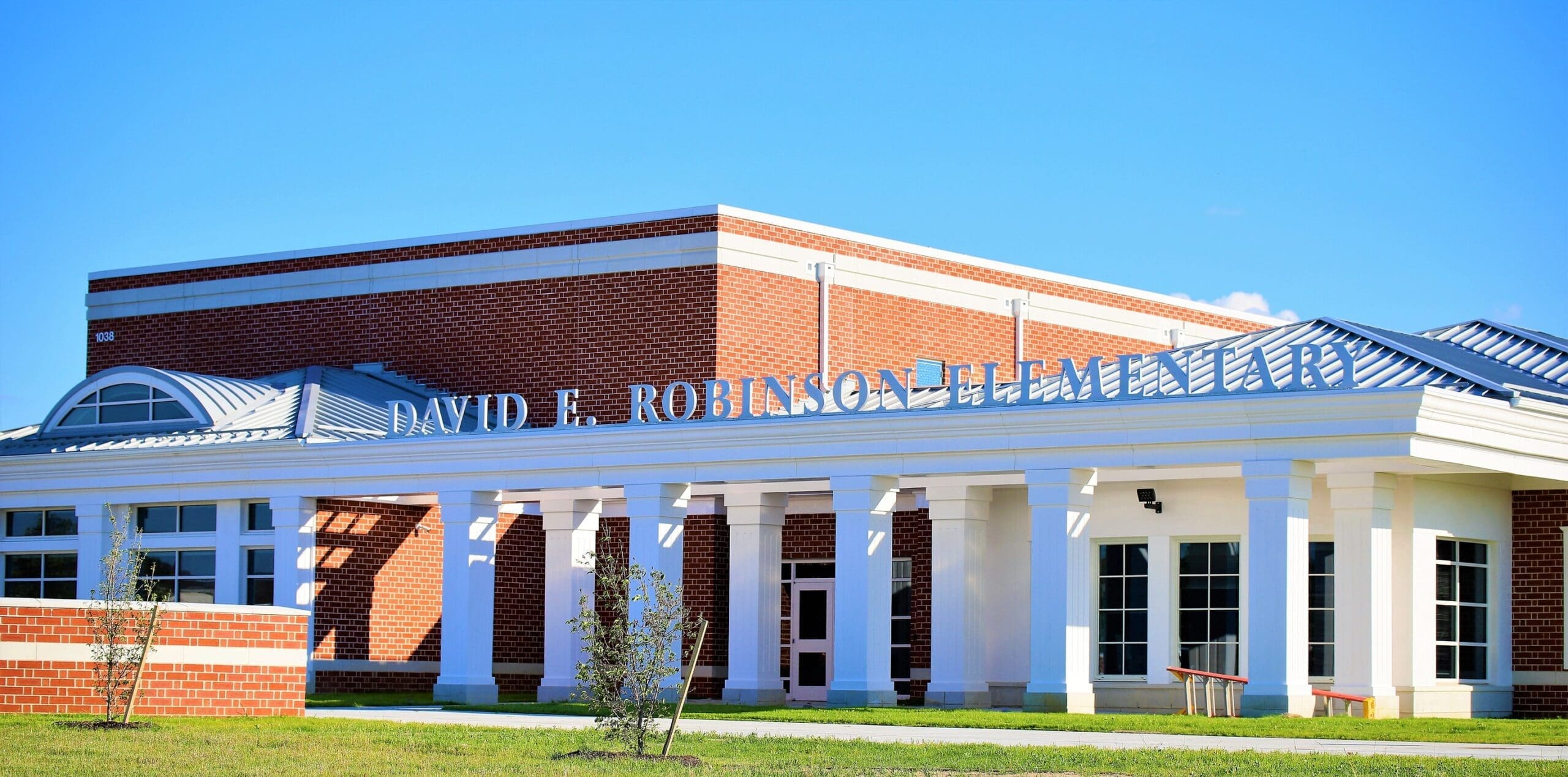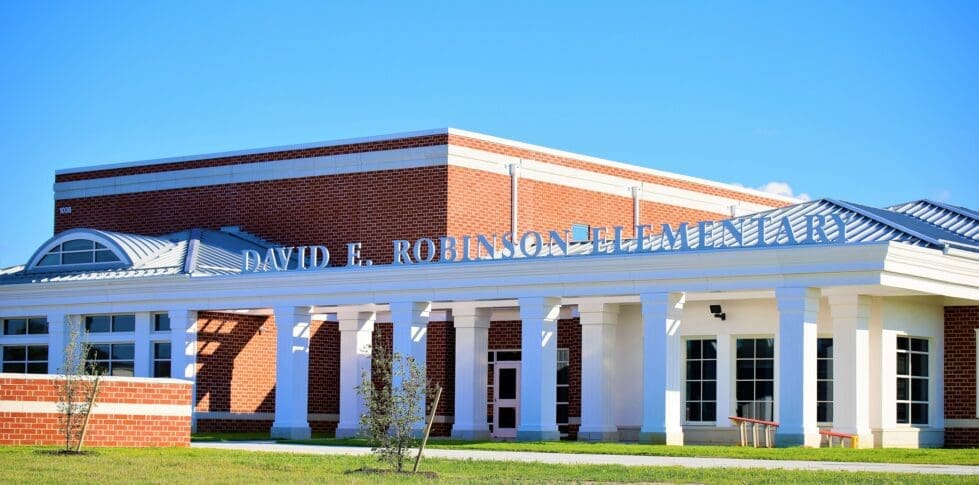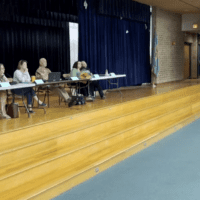

Caesar Rodney’s David E. Robinson Elementary School, located in Magnolia. (Caesar Rodney Facebook)
Caesar Rodney School District new five-year strategic plan will focus heavily on social and emotional learning.
“Meeting the needs of the child, especially around social, emotional and behavioral health was the number one item that was brought up on our students surveys, parents surveys, community surveys, teacher surveys, our talks with the Department of Education, steering committee, really across the board,” said Caesar Rodney Superintendent Christine Alois.
Recognizing and improving student mental health moved to the center of attention in schools during the COVID-19 pandemic. Students already seeking help were cut off from their normal support and the stress of virtual classes and other disruptions seemed to have triggered a wave of anxiety and other issues.
More than 1,500 surveys were turned into the district to help the steering committee create an updated strategic plan. They were reviewed by 15 focus groups before it was approved by the district school board this fall, Alois said. .
Alois said a broader approach to instruction that incorporates a student’s wellbeing, mental health, and social behaviors is now more important than ever.
Social and emotional learning aims to instill knowledge, skills and attitudes in students to develop healthy identities, manage emotions and achieve personal and collective goals.
The practice also helps students feel and show empathy for others, establish and maintain supportive relationships, and make responsible and caring decisions, according to the Collaborative for Academic, Social, and Emotional Learning.
For Caesar Rodney, the shift to social emotional learning will bring more mental health services like counseling and intervention to schools, as well as lesson plans focused on educating students on different mental illnesses and the resources available to get help.
“It’s about listening to students through social, emotional and behavioral health surveys that helps assess areas where we may need additional services, lessons, or support from personnel,” Alois said.
Even the code of conduct and school safety policies will be revised to clarify “how we address behaviors and how we will use restorative practices,” Alois said.
That could mean coming up with a counseling plan for students, for example, rather than just suspending a student and taking them out of school, which results in the student losing instructional time.
There’s already been enough learning loss over the past three years caused by the pandemic, Alois pointed out.
Some of Caesar Rodney’s other priority strategies are:
- Review current social, emotional and behavioral health programs and positions.
- Evaluate immersion and multilingual learner programming.
- Build and sustain a framework for environmental literacy.
- Review and upgrade instructional technology infrastructure and plan for the continuation of 1:1 initiative.
- Further develop and implement mechanisms to reduce/eliminate transportation challenges.
- Provide opportunities for students to be active members of the decision making process.
- Enhance inclusion opportunities for Caesar Rodney staff and students. This includes creating an equity plan and strengthening the district’s multi-tiered system of support by implementing rigorous, evidence- and research-based instruction and support for all students, academically and socially.
- Update policies, practices and infrastructure for enhanced school safety.
- Increase communication and transparency.
The district has 8,290 students across 14 schools. Of that, 45.2% are considered low-income while 5.2% of students are multi-language learners, the latest term for English language learners.
Even so, Caesar Rodney has an 88.5% graduation rate, which is 1.48% better than the state average of 87.02%.
White students make up 48.9% of Caesar Rodney’s student body, while Black students account for 28%, Hispanic students 10.6%, Multiracial students 8.7%, Asian students 3.2% and American Indian or Native Alaskan students 0.3%.
“Part of our plan is to diversify our staff,” Alois said.
The district always aims for for that, but is now focusing on making the staff representative of the diverse student population it serves, she said.
RELATED STORY: Lake Forest’s Heather Hitchens named support professional of year
RELATED STORY: Woodbridge cited for success teaching non-English speakers
Alois worked in Caesar Rodney for two decades before leaving to serve as a deputy secretary for the Delaware Department of Education in 2018.
In April, she became the first female superintendent in the district’s 107-year history.
There weren’t any serious problems in the previous strategic plan, Alois said.
It was simply outdated and didn’t account for the social and emotional needs of students as much as the new one does, she said.
“With me coming in new, it wasn’t that things didn’t happen or we needed to make stark changes to the old plan,” Alois said. “It was really just a mindset of starting with our new leadership and starting fresh after a pandemic.”
She said that the plan’s five-year length is beneficial because “the pandemic has shown that we really don’t know what’s coming.”
Having enough time to implement changes is important, she said.
“We didn’t want to make a plan that we printed, and it’s published, it’s out and then we’re done,” she said, “Those priority strategies will definitely change even over the five years. We wanted this to be this working plan that we’re continually going back in to improve and update.”
For Caesar Rodney’s complete five-year strategic plan, click here.


Raised in Doylestown, Pennsylvania, Jarek earned a B.A. in journalism and a B.A. in political science from Temple University in 2021. After running CNN’s Michael Smerconish’s YouTube channel, Jarek became a reporter for the Bucks County Herald before joining Delaware LIVE News.
Jarek can be reached by email at [email protected] or by phone at (215) 450-9982. Follow him on Twitter @jarekrutz and on LinkedIn
Share this Post








